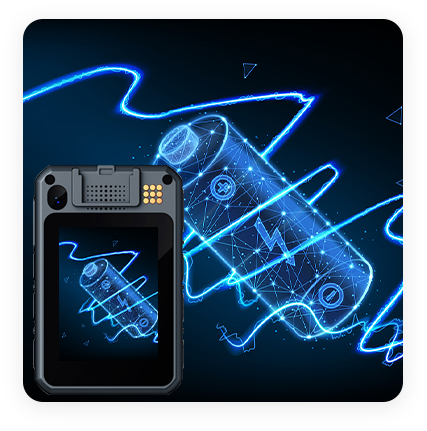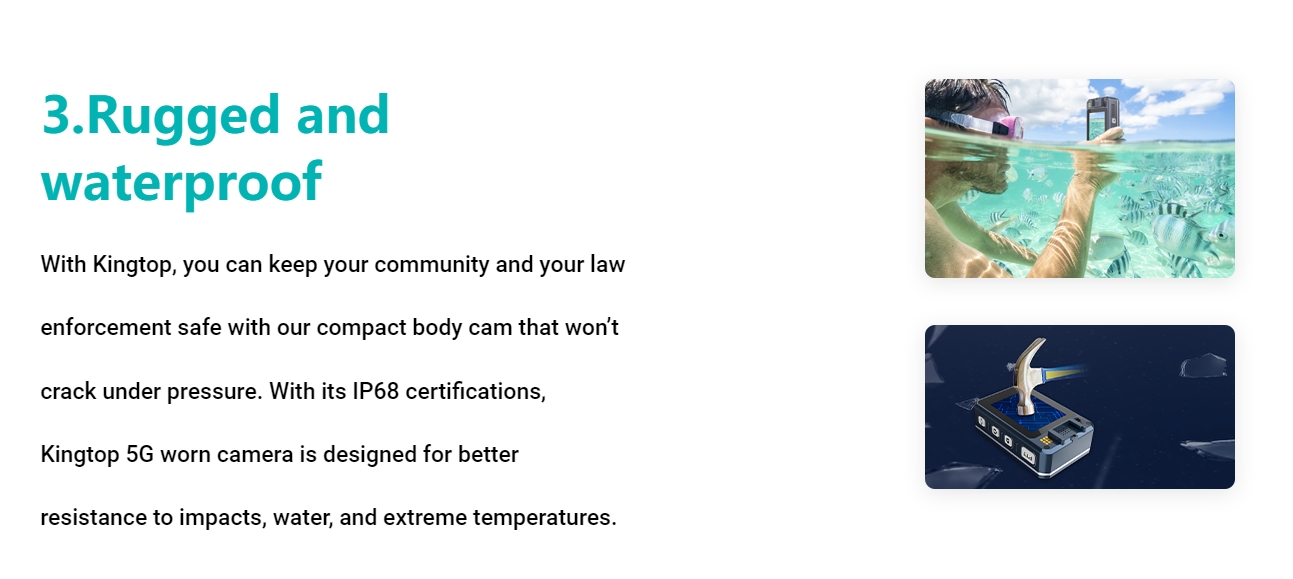Factors to consider to choose a body camera manufacturer
When choosing a body camera manufacturer, there are several factors to consider beyond customization options. Here are some additional factors to take into account:
A. Video Quality and Features: Assess the video quality and features offered by the manufacturer's body cameras. Consider additional features such as audio recording, image stabilization, pre-event recording, and configurable video resolution. The quality and features of the cameras will impact the effectiveness and usefulness of the recorded footage.

B. Ease of Use and User Interface: Consider the user-friendliness of the body cameras and the manufacturer's user interface. Look for cameras with intuitive controls, simple operation, and ergonomic design that are easy for officers to use in the field. A well-designed user interface and controls enhance officer efficiency and minimize the risk of user errors during critical incidents.
C. Battery Life and Storage Capacity: Evaluate the battery life and storage capacity of the body cameras. Longer battery life ensures that officers can record throughout their shifts without interruption. Adequate storage capacity is crucial for storing a sufficient amount of video footage. Consider cameras with options for extended battery life or hot-swappable batteries to minimize downtime, as well as cameras with ample storage capacity or expandable storage options.

D. Durability and Resistance: Look for cameras that are rugged, waterproof, and shock-resistant. Law enforcement officers operate in diverse environments and face various physical challenges, so it's important to choose cameras that can handle these conditions and continue functioning reliably.
E. Data Security and Privacy: Ensure that the manufacturer prioritizes data security and privacy. Look for cameras with strong encryption protocols to protect recorded footage during storage and transmission. When selecting a body camera manufacturer, it is important to consider whether the manufacturer follows best practices for data security and complies with privacy regulations. Features such as user authentication, access controls, and audit trails can significantly enhance data security.
F. Compatibility and Integration: Evaluate the compatibility and integration capabilities of the body cameras with existing systems and software. Consider manufacturers that provide seamless integration with evidence management systems, records management software, and video redaction tools. Compatibility with existing infrastructure minimizes disruptions and streamlines the workflow for managing and accessing recorded footage.

G. Technical Support and Warranty: Assess the level of technical support and warranty provided by the manufacturer. A reliable warranty protects your investment and ensures that any issues with the cameras can be addressed promptly and effectively.
H. Cost-effectiveness: Consider the overall cost-effectiveness of the body camera solution. Evaluate the upfront cost of the cameras, ongoing maintenance and support expenses, and any additional licensing or subscription fees for software platforms. Compare the features, quality, and support offered by different manufacturers to determine the best value for your agency's budget.
By taking these factors into consideration, law enforcement agencies can make well-informed decisions when choosing a body camera manufacturer that aligns with their specific needs, operational requirements, and budget limitations.
Industry standards and certifications of body cameras
Also, there are industry standards and certifications that law enforcement agencies should consider when choosing a body camera manufacturer. These standards and certifications help ensure the quality, reliability, and compliance of the body camera systems. Here are some important ones to look for:
A. Compliance with CJIS Security Policy: The Criminal Justice Information Services (CJIS) Security Policy is a set of guidelines established by the FBI to protect the security and confidentiality of criminal justice information. When selecting a body camera manufacturer, ensure that their systems comply with the CJIS Security Policy to safeguard sensitive data.
B. NIST Compliance: The National Institute of Standards and Technology (NIST) provides guidelines and standards for various aspects of technology, including digital evidence. Look for body camera manufacturers who adhere to NIST recommendations for data encryption, storage, and handling to ensure the integrity and reliability of the recorded footage.
C. FCC Compliance: The Federal Communications Commission (FCC) regulates wireless communication devices. It is important to choose body camera manufacturers that comply with FCC regulations to ensure the devices operate within approved frequency bands and do not interfere with other wireless communications.
D. IP Rating: The International Protection (IP) rating indicates the level of protection a device has against dust and water. Consider body cameras with a high IP rating, such as IP65 or higher, to ensure they can withstand challenging environmental conditions and continue functioning reliably.

E. MIL-STD Compliance: MIL-STD refers to a series of military standards that define the durability and performance criteria for equipment used in military applications. While not strictly necessary for law enforcement agencies, body cameras that meet MIL-STD specifications tend to be more rugged and reliable, making them suitable for demanding law enforcement environments.
F. FCC Part 15 Certification: FCC Part 15 certification ensures that electronic devices do not emit harmful interference and comply with electromagnetic compatibility (EMC) standards. Look for body cameras that are FCC Part 15 certified to ensure their safe operation and minimal interference with other electronic devices.
G. UL Listing: Underwriters Laboratories (UL) is a safety certification organization that provides validated testing and certification for various products. While not specific to body cameras, UL listing indicates that the manufacturer has met recognized safety standards and can be trusted to produce reliable and safe electronic devices.
H. Compliance with Privacy Regulations: Depending on your jurisdiction, there may be specific privacy regulations governing the use of body cameras and the handling of recorded footage. Ensure that the manufacturer's practices and policies align with local privacy regulations, such as General Data Protection Regulation (GDPR) in the European Union or specific state or national laws in your jurisdiction.

While these standards and certifications can serve as a guide, it's important to conduct thorough research and due diligence to ensure that the body camera manufacturer meets the specific requirements and regulations relevant to your agency's jurisdiction.
Recommended body camera manufacturer for you
KingTop is a renowned manufacturer that excels in providing high-quality products that cater to industry standards and certifications. With a strong commitment to excellence, KingTop has established itself as a trusted brand in delivering reliable and compliant solutions to its customers. By adhering to industry standards and obtaining relevant certifications, KingTop ensures that its products meet the highest quality and performance requirements.
One notable aspect of KingTop's offerings is its dedication to meeting industry standards. The company recognizes the importance of adhering to established guidelines and specifications to ensure the reliability and interoperability of its products. By following these standards, KingTop guarantees that its devices are compatible with existing infrastructure and can seamlessly integrate into various systems used by law enforcement agencies.
Furthermore, KingTop understands the significance of certifications in validating the quality and compliance of its products. The company strives to obtain relevant certifications that demonstrate its commitment to meeting industry standards and regulations. These certifications serve as a testament to the credibility and integrity of KingTop's products, assuring customers of their reliability and performance.
One such certification that KingTop pursues is compliance with the Criminal Justice Information Services (CJIS) Security Policy. This certification ensures that KingTop's products meet the stringent security requirements set forth by the FBI for handling sensitive criminal justice information. By adhering to the CJIS Security Policy, KingTop guarantees that its devices provide robust data protection, preventing unauthorized access and safeguarding the confidentiality of recorded footage.
In addition to CJIS compliance, KingTop also emphasizes compliance with other vital standards and certifications. The company recognizes the importance of adhering to National Institute of Standards and Technology (NIST) guidelines, which provide recommendations for data encryption, storage, and handling. By complying with NIST standards, KingTop ensures that its products maintain data integrity and adhere to best practices for digital evidence management.
Moreover, KingTop prioritizes compliance with Federal Communications Commission (FCC) regulations. This certification ensures that KingTop's wireless communication devices operate within approved frequency bands and do not interfere with other wireless communications, guaranteeing seamless and reliable communication for law enforcement personnel using their products.
Another notable aspect of KingTop's commitment to quality is its focus on IP rating. The company designs its products with high IP ratings, such as IP65 or higher, indicating superior protection against dust and water. This emphasis on durability ensures that KingTop's devices can withstand challenging environmental conditions commonly encountered in law enforcement operations, thereby ensuring their longevity and reliability in the field.
Furthermore, KingTop recognizes the importance of meeting MIL-STD specifications. Although not strictly necessary for law enforcement applications, adherence to MIL-STD standards demonstrates KingTop's dedication to producing rugged and reliable products. By meeting these military-grade standards, KingTop's devices exhibit exceptional durability and performance, making them well-suited for demanding law enforcement environments.
KingTop's commitment to quality and compliance extends beyond industry-specific standards and certifications. The company also emphasizes adherence to privacy regulations, such as the General Data Protection Regulation (GDPR) in the European Union or specific state or national laws. By respecting and complying with privacy regulations, KingTop ensures that its products align with legal requirements regarding the handling and storage of personal data, providing reassurance to customers concerned with privacy and data protection.
In conclusion, KingTop stands out as a manufacturer that provides high-quality products catering to industry standards and certifications. By adhering to these standards and obtaining relevant certifications, KingTop demonstrates its commitment to delivering reliable and compliant solutions to its customers. With a focus on industry guidelines, certifications such as CJIS compliance, NIST recommendations, FCC regulations, IP ratings, MIL-STD specifications, and privacy regulations, KingTop ensures that its products meet the highest quality and performance requirements, making them an excellent choice for law enforcement agencies seeking dependable and compliant body camera solutions.


 French
French German
German Arabic
Arabic Italian
Italian Spanish
Spanish Japanese
Japanese Persian
Persian Korean
Korean Chinese (Simplified)
Chinese (Simplified)









